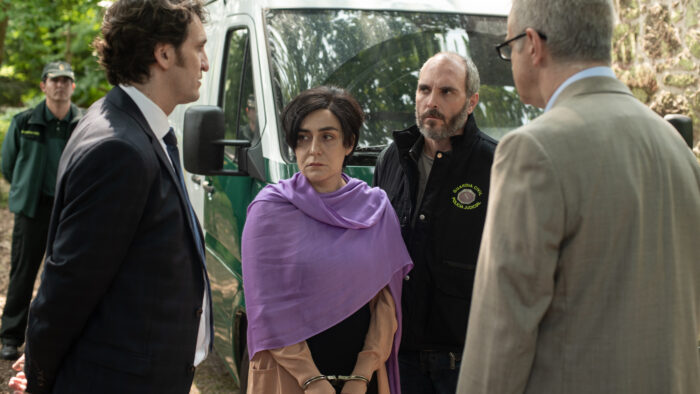True Crime Tuesdays: The Asunta Case
Review Overview
Performances
10Writing
9Toxicity
9Helen Archer | On 14, May 2024
Towards the end of September, 2013, two parents wandered into a police station in Santiago de Compostela to report their 12-year old daughter as missing. Hours later, her lifeless body was found by the side of a road, not far from the family’s holiday home, in the Galician countryside. Almost immediately – and despite the parents’ wealth, connections, and privilege – the investigating judge was convinced that they were behind the death, arresting them on suspicion of manslaughter, which was later upgraded to murder. This absorbing drama details the investigation, concluding with their 2015 trial.
It was a case that shocked Spain, throwing up questions of class, race and mental health. Asunta Fong Yang (Iris Wu) had been adopted when she was 9 months old from China by the affluent couple – Rosario Porto (Candela Peña), a lawyer with family money, and her husband, freelance journalist Alfonso Basterra (Tristán Ulloa). Asunta was the first Chinese adoptee in Santiago, and her parents had become public spokespeople for the process. The six-part series starts with a short vignette of them being interviewed about the adoption, before fast-forwarding to the night of Asunta’s death.
It is very much a procedural drama, following detectives Agente Cruces (María León) and her partner Agente Ríos (Carlos Blanco) as they report to the bullish and single-minded Judge Malvar (Javier Gutiérrez), whose perspective on the case borders on the obsessional, and who may or may not be feeding a hungry press with titbits that convince the public of the couple’s guilt, long before the trial commences. But there are, too, some brief sojourns into the private lives of the investigators – with Cruces struggling to conceive, Ríos looking after his granddaughter, and Malvar struggling with his dementia-suffering father. Though superfluous, these digressions are not enough to turn this into a soap and the focus remains steadfastly on the investigation, leading to the trial in the final episode.
But it does, too – by necessity – look at the Basterra-Porto marriage. By the time of Asunta’s murder, the couple had divorced, following Rosario’s affair with another man. Rosario held on to her wealth, inherited from her recently-deceased parents, while Alfonso took a small apartment around the corner from her large apartment in an upscale neighbourhood of Santiago. Still, he held power over her, his dominance notable via the conversations they had in their adjoining prison cells, which had been bugged by the police. Neither of them ever turned on the other in order to attempt to lessen their own guilt – their secrets bound them together in a toxic co-dependency.
It is never clear exactly what happened that night – frustratingly, it probably never will be. The penultimate episode looks at the vying theories, playing out the possibilities of Rosario acting alone, and Alfonso covering up for her, versus Alfonso leading the diabolical plan. The clever writing brings all elements of the case together, and it is up to the audience to draw their own conclusions.
What gets lost in all of this is Asunta. We know that she was academically gifted, hard-working and that she was put up a year in school. We know that she had all kinds of talents, and the strength of character to capitalise on them. That she doubtless had a wonderful future ahead of her. Yet the story of her life gets lost in the story of her death, and the story of her morally bankrupt parents. Perhaps this is inevitable in the case of a murdered child, their promise snuffed out by those who were meant to nurture it. The Asunta Case is a reminder that seemingly perfect families, shrouded by a cloak of privilege, can be hiding unfathomable cruelties.


















